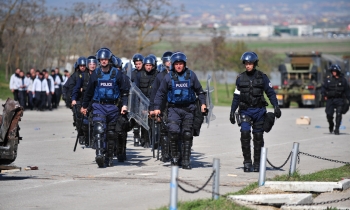LAUSANNE, Switzerland: The International Olympic Committee said Friday it expects Chinese authorities to give the media full freedom to report on the Beijing Games, responding to complaints from a media rights group.
The group, Reporters Without Borders, said the IOC has remained silent while China clamps down on reporters during preparations for the Aug. 8-24 Olympics.
"It is becoming clearer and clearer that the organizers of the Beijing Olympics and the Chinese security apparatus have decided to control journalists very closely before and during the games," said Robert Menard, secretary-general of the group.
The IOC said Beijing organizers promised from the start that there would be "no restrictions" on journalists reporting at the games, and that senior Chinese officials have repeatedly reiterated assurances the media would be free to work under the same conditions as at previous Olympics.
"A great deal of effort is being made by BOCOG and the Chinese authorities to uphold these assurances," IOC spokeswoman Emmanuelle Moreau said. "There is work still to do, but the IOC believes in the good will of the Chinese to deliver the necessary environment for the 20,000 accredited media who will come for the games."
IOC President Jacques Rogge repeatedly has said the Beijing Olympics will be a positive force in China. But he says the IOC is a sports body, not a political or government organization, and is not in a position to change Chinese policy on human rights or other political issues.
ad_icon
"It is natural for human rights and other organizations to use the Beijing Olympic Games to draw attention to reforms they believe China should enact as quickly as possible," Moreau said. "The games can only be a catalyst for constructive dialogue in a complex and sensitive transformation that is taking place in compressed time."
In an open letter Thursday to Rogge, Reporters Without Borders cited "disturbing reports" about the way Chinese authorities are planning to deal with the tens of thousands of journalists expected to attend the Olympics.
Menard referred to reports that Chinese authorities planned to compile files on journalists and reserved the right to turn them back even if they were accredited by national Olympic committees.
Chinese officials earlier this month denied widely published reports that a database was being kept on foreign journalists who plan to cover the Olympics.
The IOC said there was "some confusion" about the issue.
"At the games, all accredited media's details will be held on a database in order to facilitate the accreditation process," Moreau said. "This is only natural and is the same as for previous editions of the games."
The IOC also said it is standard procedure at all Olympics for accredited personnel to receive a background check by local security authorities.
"This is not new for the Beijing Games and will continue to be the case in future editions of the games," Moreau said.
Reporters Without Borders also cited recent leaks in the media about instructions given to security departments for identifying groups in China and abroad that are likely to want to demonstrate during the Olympics.
"Journalists could also be targeted by this preventive surveillance, and it is possible that hundreds of people will be banned from entering China," the letter said.
Reporters Without Borders said it has written to Rogge before and held meetings with IOC officials in Lausanne, Switzerland, but no "concrete measures" ensued.
"The organization you head is constantly trumpeting the progress being made with the work on the Beijing games infrastructure but it has not made any public statement of concern about the lack of freedom of expression, which will undermine the work of the media and the transparency that is needed for the games," the group said.
"Mr. Rogge, it is your silence that has unfortunately made all these abuses possible."









